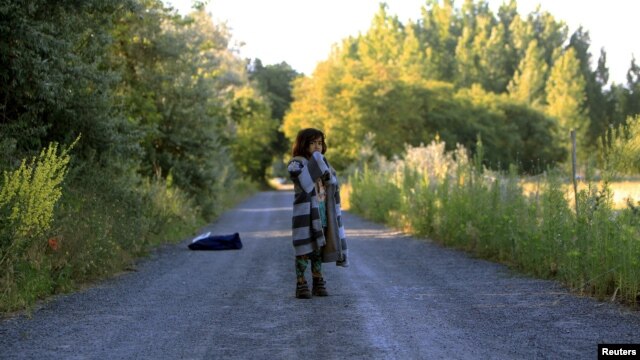EU warns against new 'walls' as Hungary plans fence on Serbia border
| Publisher | Radio Free Europe/Radio Liberty |
| Publication Date | 18 June 2015 |
| Cite as | Radio Free Europe/Radio Liberty, EU warns against new 'walls' as Hungary plans fence on Serbia border, 18 June 2015, available at: https://www.refworld.org/docid/55b5f3e715.html [accessed 18 May 2023] |
| Disclaimer | This is not a UNHCR publication. UNHCR is not responsible for, nor does it necessarily endorse, its content. Any views expressed are solely those of the author or publisher and do not necessarily reflect those of UNHCR, the United Nations or its Member States. |
June 18, 2015
By RFE/RL's Balkan Service
 An Afghan girl stands on a road after crossing the Hungarian-Serbian border illegally near the village of Asotthalom on June 18.
An Afghan girl stands on a road after crossing the Hungarian-Serbian border illegally near the village of Asotthalom on June 18.
The European Commission has responded to a Hungarian scheme to erect a fence on the border with Serbia by warning EU members against steps that contravene EU obligations and urging members like Hungary to find other ways to cope with an inflow of illegal migrants.
"The commission does not promote the use of fences and encourages member states to use alternative measures," Natasha Bertaud, the European Commission's spokeswoman for justice and home affairs, told a news briefing in Brussels on July 18. "We have only recently taken down walls in Europe. We should not be putting them up."
Hungary's foreign minister announced preparations for the "4-meter-high fence" on the 175-kilometer border with non-EU member Serbia on June 17, saying that Budapest "cannot afford to wait any longer" to stem a raging illegal immigration problem.
The plan elicited "shock and surprise" from Serbian Prime Minister Aleksandar Vucic, whose country has seen the number of such migrants transiting his country skyrocket as they flee conflict zones across the Mediterranean.
Bertaud stressed that while EU members "have the responsibility to manage their borders and it is up to them to identify the measures that should be put in place to make sure that their part of the external EU borders are secure ... Any measure taken by EU member states to manage their borders and to deal with migratory flows has to be fully in line with EU laws and international obligations, including the respect of migrants' human rights and respect of the principle of nonrefoulement" – that is, not forcibly repatriating refugees or asylum seekers if they are liable to face persecution in their country of origin – "in case of people which need international protection."
Word of the Hungarian plan has evoked memories of Cold War-era divides between communist Eastern Europe – which included Hungary – and the West.
It also comes just two weeks ahead of a planned joint Hungarian and Serbian government session to demonstrate improved bilateral relations.
Serbia, which officially launched accession negotiations with the EU in January 2014, has suggested that many of the illegal migrants are entering EU territory through member states Bulgaria and Greece.
Hungary accepted 43,000 refugees in 2014, which is more per capita than any other EU country except Sweden, but government figures show some 54,000 migrants have entered the country so far this year, many of them reportedly via Serbia.
The far-right mayor of the village of Asotthalom, in southern Hungary, Laszlo Toroczkai, told RFE/RL's Balkan Service that there is "only one country that migrants fleeing war can enter Hungary from, and that's Ukraine."
"Other migrants coming to Hungary have passed through several countries that are safe, and some are members of the European Union, so all of these are actually economic migrants and not political [ones]," Toroczkai said.
He added that while he had only learned of the planned fence via media, "my personal opinion is that the Hungarian government received a signal from the EU that our government can do this."
Istvan Pastor, a political representative of the Hungarian minority and speaker of the Vojvodina Assembly in that autonomous province in Serbia, has suggested to the Serbian public that the fence "won't change your life."
Link to original story on RFE/RL website
